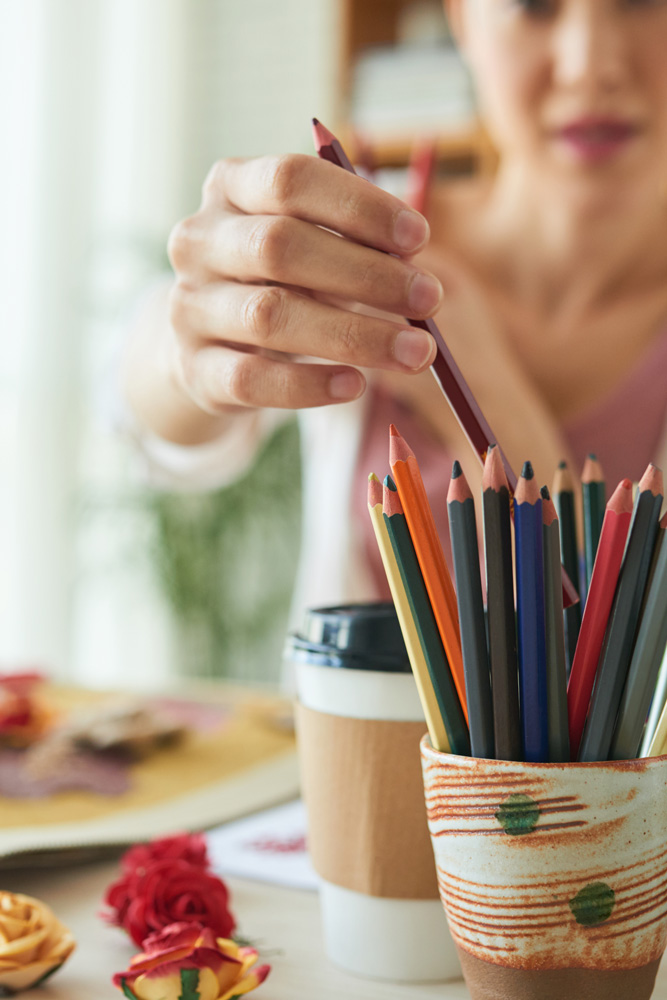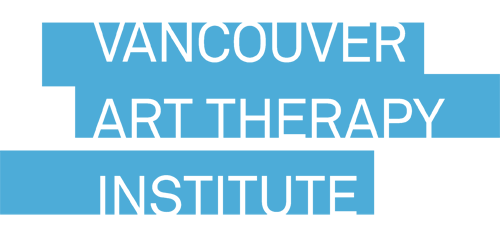
ART THERAPY PROGRAM
Our 15-month diploma stream is a blended program designed for people with a Bachelor’s degree.
ART THERAPY PROGRAM
The 15-month diploma stream has been offered through the Vancouver Art Therapy Institute since 1982; over the last 30 years, it has changed with respect to the service delivery model, compressed from what was initially a 2-year program to a now 15-month program. The current program is a blended program that combines face-to-face and online learning; the face-to-face component is conducted once a month over a weekend, accommodating students who work during the week.
While the pace of the program is quite intense, graduates come away with a thorough understanding of art therapy; this includes the personal and experiential component through the studio class, the academic component through relevant course work, and lastly, the clinical component through placements in the community and supervision. The final project allows for a synthesis of all of these components.
The faculty of the Vancouver Art Therapy Institute is diverse with respect to background and areas of specialization; we are interested as a school in offering the highest calibre of instruction, with a number of our faculty (and graduates) having been published in areas of research pertaining to art therapy. As we are motivated to ongoing curriculum development, we continue to engage in our own training and professional development, including doctoral studies in the case of two faculty members.
TRAINING PHILOSOPHY
At VATI we train art therapists using a meta-theoretical, client-centered approach that includes contemporary theories from broader paradigms.
Our curriculum challenges students to advance their therapeutic values and practical approaches through different lenses. We incorporate psychotherapy, anthropology, sociology, aesthetic theory, social action and critical theory to encourage students to become more aware of themselves, and their clients, in the therapeutic frame. Our students see how social policy and theory affect human beings, and whole communities through their clinical placement experiences.
By focusing on training professionals through a practical approach, our program brings together the theory and practice of arts-based psychotherapy in the following ways:
- By engaging in their own art journey, students gain a personal understanding of the power of the creative process.
- Through clinical placement experience in the community, students gain familiarity with a wide variety of client groups.
- Through the study of advancing research and theory in the field, students integrate both experiential and theoretical appreciation of art therapy.
- Students are well prepared for professional therapeutic practice with a strong ethical foundation.
The emphasis is on promoting therapeutic relationships with clients as well as contributing to a multi-disciplinary approach to mental health.
TUITION
- Tuition fees for the program are $18,000.00 payable in four installments. Foreign student fees are $18,500.00 (CAD).
- On acceptance into the program a $175.00 CAD non-refundable registration fee is required.
- Canadian students are eligible to apply for bank loans.
- On entry into the program students will sign a financial agreement contract as required by the Private Training Institutions Branch of British Columbia.
- Extra to program costs: Students should have access to a digital camera and PowerPoint for recording and presentation purposes.
VATI OFFERS 2 ART THERAPY PROGRAM STREAMS
A 15-month Diploma Stream and an Advanced Diploma Stream. Both follow the guidelines for training art therapists as established by the British Columbia and Canadian Art Therapy Associations.

CALENDAR
The 15-month diploma stream is a blended or hybrid program that combines the benefits of face-to-face classroom learning with flexible, online learning and discussions; it has been designed to leverage the strengths of various learning modalities. The online learning component utilizes the platform Moodle for weekly lesson plans, as well as Zoom to further deepen and expand on various themes, foundational competencies, and practical skills.
IN-PERSON WEEKEND SEMINARS
The Studio: Art Therapy Training and Techniques occurs in person one weekend a month (from September to January) and culminates with a weekend online class in February. This includes one weekend in October where students are introduced to the Ethics of Art Therapy and Assessment, the courses that are needed to begin the clinical placement:
- Studio: Art Therapy Trainings and Techniques – in-person (September-January)
- Ethics of Art Therapy – Moodle & in-person (October)
- Assessment – Moodle & in-person (October)
- Studio: Who Do You Think You Are/The Business of Art Therapy – Zoom (February)
ONLINE COMPONENT
Students begin the online component of the program in the second month, with all of these courses being a combination of online lesson plans and weekly forums through Moodle as well as Zoom classes to supplement online learning. The following courses are offered sequentially online from the September start date through to the end of November of the following year:
- Supervision Orientation – Zoom (September-October)
- Clinical Supervision (ongoing monthly) – Zoom (November to end of program)
- Research Methods – Moodle/Zoom (November-December)
- Human Development and Art Therapy – Moodle/Zoom (January-February)
- Child Art Therapy – Moodle/Zoom (February-March)
- Adolescent Art Therapy – Moodle/Zoom (February-March)
- Salutogenesis: Abnormal Psychology and Art Therapy – Moodle/Zoom (February-April)
- Cultural Care and Intersectionality: Equity and Diversity in Art Therapy – Moodle/Zoom (April-May)
- Trauma-Informed Art Therapy – Moodle/Zoom (May-June)
- Group Art Therapy & Family Art Therapy – Moodle/Zoom (June)
- The Art of Loss – Moodle/Zoom (July)
- History and Theories: Arts-Based Psychotherapy – Moodle/Zoom (September-October)
- Case Studies – Zoom (November)
CLINICAL PLACEMENT REQUIREMENTS
Over the span of the program, 700 hours of art therapy clinical placement experience will be gained through an approved local school/agency/hospital, 300 of which are direct client contact hours. Students are also encouraged to seek out placement sites that may interest them but are not currently included on our active list of placement sites. The initial clinical placements tend to be at an elementary school in the lower mainland, with 4-6 hours of client contact per week. Placements do not begin until late October after Ethics and Assessment courses have been taken. In January, students add a second clinical placement based on the client population they are interested in. On average, students should be logging 10-12 practicum hours a week by February. Students are welcome to engage in more than two clinical placements over the span of 15 months.
FINAL PROJECT
Students will also complete a final project. The final project is offered as a guided independent study. Working with a final project advisor, students will research a topic of personal interest related to the field of art therapy
APPLICATION PROCESS
- The pre-requisite for application to this program is a Bachelor’s degree.
- Download the 15-Month Program Application Form (PDF).
- View our Letter of Reference Guidelines (PDF).
- When complete application materials have been received, interviews are arranged.
- On acceptance, a letter of confirmation and date of entry is sent to the applicant.
- Applications are due by March 30th. Candidates are invited to apply early.
- Subject to space availability late applications may be considered.
LANGUAGE PROFICIENCY ASSESSMENT POLICY
Due to the high level of literacy skills and English language proficiency standards required in order to do counselling, applicants will need to submit their results for either the TOEFL or the IELTS exam. The minimum total score on the Internet-based TOEFL for all applicants to the diploma or advanced diploma program is 85. The minimum total score for the paper-based test is 575. TOEFL results will be valid for one year after the test is taken. If using IELTS (International Language Testing System), the score required is 6.5.
ATTENDANCE
Students attend the program with their original cohort rotation. If a leave of absence is necessary, arrangements may be made for reentry, subject to space availability.
WITHDRAWALS
In the event of withdrawal prior to completing the program, students receive refunds as mandated by PTIB (Private Training Institutions Branch). View our refund policy.
REGISTRATION AND ASSOCIATIONS
According to the credit system and art therapy practicum hours, the full-time diploma program satisfies the art therapy education requirements established by the provincial associations in Canada, and the Canadian Art Therapy Association.
Graduates are eligible to apply for Registration with their provincial art therapy associations, as well as the CRPO in Ontario.
COURSE DESCRIPTIONS
ASSESSMENT
ART THERAPY AND ASSESSMENT
ETHICS OF ART THERAPY
CASE STUDIES
INTERVENTIONS
Child Art Therapy (delivered online)
Adolescent Art Therapy (delivered online)
Family Art Therapy
Abnormal Psychology and Art Therapy (delivered online)
Group Art Therapy
Equity and Diversity and Art Therapy (delivered online)
The Art of Loss (delivered online)
Art Therapy History and Theory: Arts Based Psychotherapy (delivered online)
Throughout this course, students will acquire an understanding of key figures, theoretical approaches, and current trends in the field. Art therapy will be situated with other historical and contemporary healing practices, with the aim of understanding and expanding on their significance in regard to the practice of art therapy. Students will have the opportunity to see how art therapy has proliferated and expanded beyond its early psychoanalytic roots, as art therapists have increased the theoretical lenses through which they perceive art therapy. Selected course readings and assignments will allow students to develop their looking and listening perspectives and their own emerging theory of the practice of art therapy.
Human Development and Art Therapy (delivered online)
TRAUMA INFORMED PRACTICES IN ART THERAPY (DELIVERED ONLINE)
Trauma Informed Practices in Art Therapy is an online course that brings together the awareness of the complex impact of trauma on an individual’s suffering. Throughout the course, students will become familiar with how art therapy could be utilized effectively to weave together, within a relational context, creativity, movement and the body, and the power of the image to support clients to experience a renewed sense of vitality.
PRACTICE & PROFESSIONAL PRACTICE
Studio: Art Therapy Trainings and Techniques
An experiential course offering students a direct and personal exploration of the art therapy process. Students will participate in weekly art-making session and discussions using their spontaneous artwork. In understanding and deepening their own creative process and visual vocabulary, students will develop sensitivity and insight into their clinical experience.
FINAL PROJECT
SUMMARY
Clinical Placement
Supervision
SOCIAL MEDIA
CONTACT
Vancouver Art Therapy Institute
#300 - 291 E. 2nd Ave.
Vancouver, BC V5T 1B8
Phone: 604-681-8284
Email: info@vati.bc.ca
Expressive Arts Therapy Contact
Email: heatherdawson@vati.bc.ca
Email: sabette@vati.bc.ca
